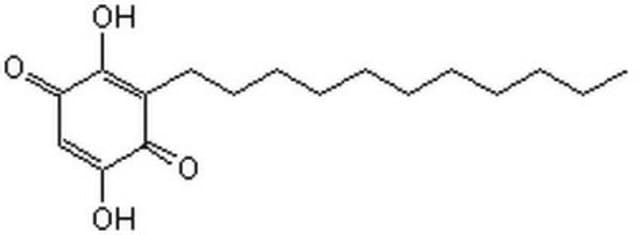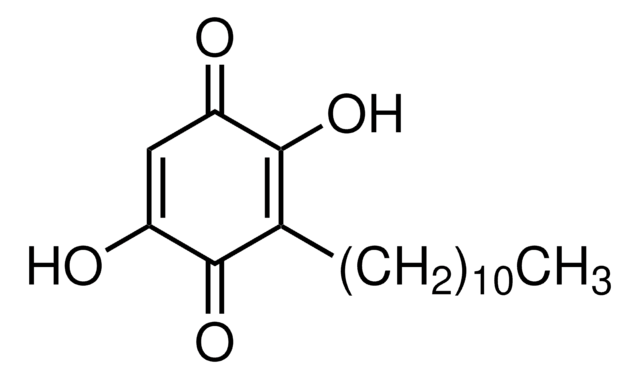E1406
Embelin
≥98% (HPLC), powder
Synonym(s):
2,5-Dihydroxy-3-undecyl-2,5-cyclohexadiene-1,4-dione, Embelic acid, Emberine
About This Item
Recommended Products
Quality Level
Assay
≥98% (HPLC)
form
powder
solubility
DMSO: >10 mg/mL
H2O: insoluble
antibiotic activity spectrum
Gram-negative bacteria
Gram-positive bacteria
parasites
Mode of action
DNA synthesis | interferes
SMILES string
CCCCCCCCCCCC1=C(O)C(=O)C=C(O)C1=O
InChI
1S/C17H26O4/c1-2-3-4-5-6-7-8-9-10-11-13-16(20)14(18)12-15(19)17(13)21/h12,18,21H,2-11H2,1H3
InChI key
IRSFLDGTOHBADP-UHFFFAOYSA-N
Gene Information
human ... XIAP(331)
Looking for similar products? Visit Product Comparison Guide
General description
Application
- to study its effects on the receptor activator of nuclear factor kappa-B ligand (RANKL)-induced nuclear factor of activated T cells (NFATc1) luciferase activity
- to study its role in the mechanisms mediating Parkinson′s disease (PD)
- in treating whole mouse embryos to determine its effects on the X-linked inhibitory apoptosis protein (XIAP) activity
Biochem/physiol Actions
Signal Word
Warning
Hazard Statements
Precautionary Statements
Hazard Classifications
Repr. 2
Storage Class Code
11 - Combustible Solids
WGK
WGK 3
Flash Point(F)
Not applicable
Flash Point(C)
Not applicable
Personal Protective Equipment
Certificates of Analysis (COA)
Search for Certificates of Analysis (COA) by entering the products Lot/Batch Number. Lot and Batch Numbers can be found on a product’s label following the words ‘Lot’ or ‘Batch’.
Already Own This Product?
Find documentation for the products that you have recently purchased in the Document Library.
Customers Also Viewed
Articles
Chronic inflammation is an underlying factor in the development and progression of many of the chronic diseases of aging, such as arthritis, atherosclerosis, diabetes, and cancer.
Our team of scientists has experience in all areas of research including Life Science, Material Science, Chemical Synthesis, Chromatography, Analytical and many others.
Contact Technical Service













